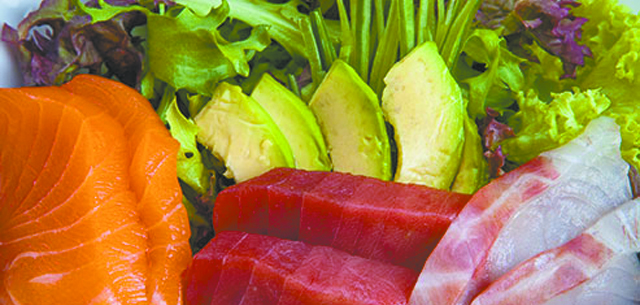 Because March is National Nutrition Awareness Month, along with a good exercise routine and regular check ups with your physician, cholesterol levels can naturally be lowered with the proper foods.
Because March is National Nutrition Awareness Month, along with a good exercise routine and regular check ups with your physician, cholesterol levels can naturally be lowered with the proper foods.
A big part of lowering your LDL or low-density lipoprotein is through adding soluble fiber, omega 3 fatty acids, monosaturated fatty acids or MUFAs, powerful antioxidants and lutein to your diet. Some of the following foods listed below can literally lower your “bad” cholesterol levels by 5-10% within just a few weeks. But in order for these nutrients to make the most effective decrease in your cholesterol, you must adhere to an overall healthy diet. You can’t eat fried chicken and then eat an apple and think you’ll get the benefit. You’ll need to make a plan to eliminate the processed foods in your diet.
. Cholesterol Lowering Foods
. Garlic
. Oatmeal and Oat bran
. Pears
. Apples
. Prunes
. Beans
. Red wine
. Fatty fish (salmon and sardines)
. Nuts
. Black tea
. Spinach
. Olive Oil
Garlic can limit plaque buildup in the arteries and should be consumed raw if possible. You can achieve this by adding a few minced cloves at the very end of your cooking or add it to your salsa, salad dressings, or hummus spread.
Soluble fibers are found in foods like beans, apples, pears, prunes and oats. When bile acids are removed from your blood, the liver must use cholesterol to produce more bile. This is where soluble fiber comes into play. It binds to the bile acid and therefore lowers the cholesterol in the body.
Oats contain a compound called beta-gluten. When digested, beta-gluten essentially absorbs LDL in the bloodstream. People that eat oatmeal or oat bran several times a week can see a significant improvement in their cholesterol level.
Fatty fish contain omega 3 fatty acids, which also aid in lowering LDL. They are a healthy alternative to saturated fats that are found in other animal protein and lard.
Red wine is thought to help to lower cholesterol through the polyphenol antioxidants. It’s best to drink in moderation, as too much wine has a counter effect on the heart.
Spinach and other leafy greens contain an antioxidant called lutein. Lutein is a powerful anti-fat lipid element that when eaten on a regular basis can reduce your cholesterol considerably.
Black tea, in particular, has been shown to reduce LDL by up to 10% in as little as a month in some patients. Drinking it iced or hot, you can’t go wrong, but keep the sugar to a minimum, as sugar counteracts the effectiveness of the compounds in the tea.
Avocado and olive oil are excellent forms of MUFAs or monosaturated fatty acids. These MUFAs lower LDL by replacing saturated fats like butter or margarine. Avocado is also an outstanding source of fiber.
It’s always best to speak directly with your physician before completely changing your diet or exercise program. Your doctor will construct a precise plan to suit your specific needs and incorporate some of the foods mentioned above along with a coordinated strategy.
Dr. Thiruvallur Vallabhan is devoted to keeping your heart at its healthiest. Dr. Vallabhan is a Board Certified Cardiologist, and his mission is to provide The Villages and its surrounding communities with the highest quality cardiac care in a welcoming environment. He and his staff are dedicated to fulfilling the specific cardiac needs of each patient.
To find out more information about Dr. Vallabhan, your local specialists in the diseases of the heart, veins, and arteries, please call (352) 750-2040 or visit them online at, www.drvcardio.com.
This information is for educational purposes only and is not intended to replace the advice of your doctor or health care provider. We encourage you to discuss with your doctor any questions or concerns you may have.
Dr. Vallabhan
352-750-2040
www.drvcardio.com
Rolling Oaks Professional Park
929 N. US Highway 441, Suite 201
Lady Lake, FL 32159
Check Also
Recurrent UTIs: Addressing the Risk of Antibiotic Resistance
Urinary tract infections (UTIs) are common bacterial infections that affect millions of individuals worldwide each …
 Central Florida Health and Wellness Magazine Health and Wellness Articles of the Villages
Central Florida Health and Wellness Magazine Health and Wellness Articles of the Villages



